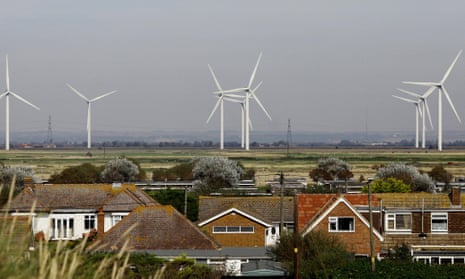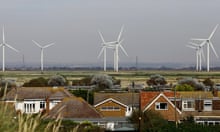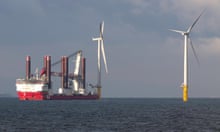The Australian investment bank on the verge of buying the UK’s publicly owned Green Investment Bank has launched a Westminster charm offensive after parliamentarians of all parties told Theresa May to halt the £2bn sale.
Green party co-leader Caroline Lucas, the Lib Dems’ Vince Cable and former Tory minister Gregory Barker last month warned that a sale to Macquarie would put the bank’s green purpose at risk and its most valuable assets, such as large windfarms, could be sold off.
The flurry of interventions prompted Macquarie, dubbed the “Vampire Bank” for its track record after buying Thames Water, to write to MPs in an attempt to assuage their concerns over its commitment to low carbon projects. The investment bank said it had a “substantial” and “longstanding” commitment to renewable energy in emails seen by the Guardian.
Macquarie also appears to have tried to win over critics who had accused it of being an asset stripper, writing: “In meeting the responsibilities that come with owning and managing public assets … [we] have a strong track record of ongoing capital investment to support operational growth.”
A source close to the sale process told the Guardian that there had been a lot of frustration in government and at Macquarie over the focus on asset ownership, which has been fuelled in part by the Green Investment Bank creating 14 new companies ahead of its privatisation.
“One thing that’s always been clear about the Green Investment Bank is that its value has been in funding new projects, not necessarily keeping old ones,” the source said.
The delay over the sale, which had been expected to complete in January, is down to Macquarie and the government haggling over a final price in the region of £2bn, the Guardian understands. The Australian bank was selected as preferred bidder last October, and submitted a revised bid after Christmas.
The sale to Macquarie is expected to be announced in mid-March, sources said.
The government has refused to even confirm Macquarie is its preferred bidder, citing commercial sensitivity. Ministers have insisted the deal will be good value for money for taxpayers, who funded the bank’s launch in 2012, and that its “green purposes” of funding renewable energy and other environmentally sound projects will be protected by a special share owned by the government.
But Greenpeace said that documents it had obtained from the Green Investment Bank via freedom of information requests showed the special share would not rule out the privatised bank investing in fossil fuels.
“The primary option for the special shareholder to prevent, or to challenge after the fact, any restricted activities would be to bring a derivative claim against the directors of GIB,” says the document, Rights of the Special Shareholder, which the Guardian has seen.
However, lawyers said derivative action was unlikely to be an effective method of challenging the bank’s new owners if they invested in projects that went against its green objectives.
“If the government is putting all their hope in the effectiveness of this special share to make sure the bank acts in its green purpose, our concerns are not assuaged by this,” said Jonathan Church, a lawyer at ClientEarth. “The derivative action, to police those [green] objectives, is shaky and shouldn’t be relied on.”
Doug Parr, policy director at Greenpeace UK, said: “The world has changed since the 2015 decision to privatise the GIB, and there is an urgent need to protect its green purposes from being diluted.
“But the government’s plan to protect them is toothless. There’s almost nothing to stop Macquarie from misusing this vital public institution by failing to invest in early-stage renewables, and even funding fossil fuel projects like fracking.”
Lord Barker, a former climate change minister, and Cable, a former business secretary, warned ministers this week that the taxpayer risked being shortchanged by the sale, as assets such as offshore windfarms under construction would be worth far more later.
“It is clear that this could amount to a windfall of hundreds of millions of pounds to Macquarie, at the expense of the taxpayer,” they said in a letter to business secretary Greg Clark.
Macquarie declined to comment.
What assets does the green bank hold?
It has stakes, either directly or via funds managed by third parties, in 85 projects that vary from an energy efficient street lighting project in Barking and Dagenham, a windfarm in Dumfries and Galloway and biomass plant at Port Talbot, to an energy-from-waste plant in Belfast; it is also helping turkey and chicken food company Bernard Matthews replace its boilers.
The bank also manages the world’s first offshore wind fund, which is comprised of private capital from a sovereign wealth fund, European institutional investors and a number of UK pension funds. Finally, there’s a joint venture with the UK government, funded with £200m of capital, to invest in green infrastructure projects in India and Africa.







Comments (…)
Sign in or create your Guardian account to join the discussion